Who’s next? Abe’s party maneuvers to pick Japan’s next PM
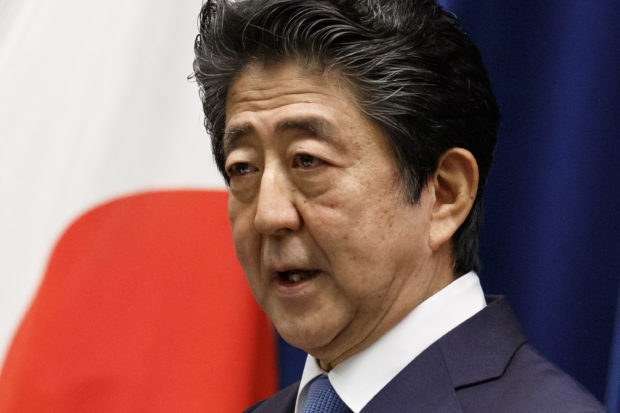
In this June 18, 2020, file photo, Japan’s Prime Minister Shinzo Abe speaks during a press conference at the prime minister’s official residence in Tokyo. (Rodrigo Reyes Marin/Pool Photo via AP, File)
TOKYO — With Prime Minister Shinzo Abe announcing his plans to step down due to health reasons, members of his ruling party are furiously maneuvering ahead of an internal vote that will ultimately decide his successor.
Executives of Abe’s ruling Liberal Democratic Party met Tuesday and decided that the Sept. 14 vote for party leader — and with it, the almost assuredly prime minister — will be limited to lawmakers and not broader members of the party. Some younger lawmakers had called for the latter to be included in order to make the process more open and democratic.
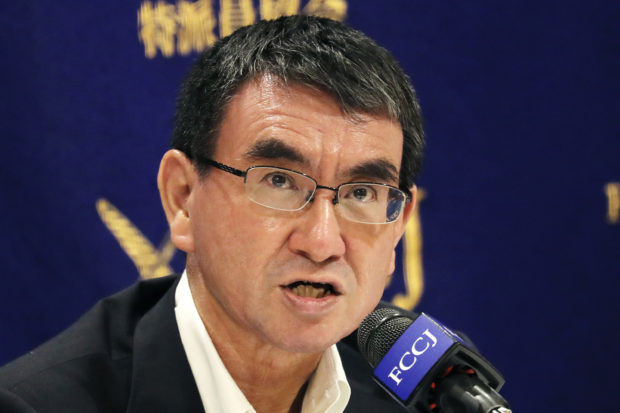
In this June 25, 2020, file photo, Japanese Defense Minister Taro Kono speaks during a press conference in Tokyo. Japanese Prime Minister Shinzo Abe’s announcement of his planned resignation has triggered political maneuvering among top lawmakers and media speculation over who will take over the top job. Social media-savvy Kono has gained popularity among the public with his witty tweets. (AP Photo/Koji Sasahara, File)
Whoever is chosen will fill in for the rest of Abe’s term, until September 2021. The next prime minister will face a number of challenges, including the ongoing fight against COVID-19, managing the Tokyo Olympics that has been postponed to next summer, setting Japan’s security policy in the face of an increasingly assertive China, and dealing with the results are of the presidential election in the U.S., Japan’s key ally.
Here are the three candidates, who have either announced their intention to run or are expected to do so:
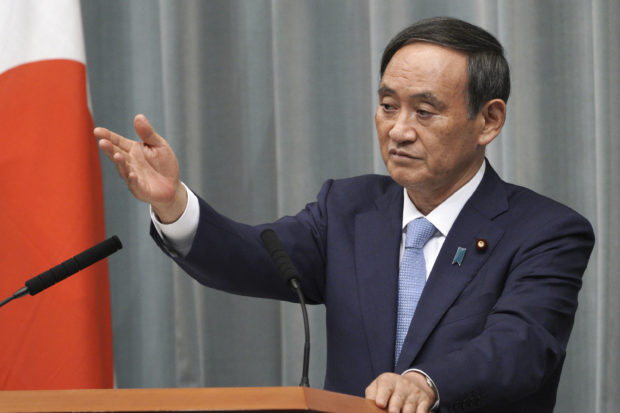
In this Sept. 11, 2019, file photo, Chief Cabinet Secretary Yoshihide Suga speaks during a press conference at the prime minister’s official residence in Tokyo. Japan’s top government spokesman Suga, a longtime right-hand man for the outgoing Prime Minister Shinzo Abe, has emerged as a top successor candidate Tuesday, Sept. 1, as party executives met to decide logistics of a party presidential election expected in mid-September. (AP Photo/Eugene Hoshiko, File)
YOSHIHIDE SUGA: Japan’s top government spokesman and Abe’s longtime right-hand man, the 71-year-old Suga has emerged as the favorite among ruling party heavyweights. Suga has been pegged by the party secretary-general as the best caretaker who can ensure the continuation of Abe’s policies. The son of a farmer in the northern prefecture of Akita, Suga is a self-made politician, rare in Japan’s largely hereditary world of politics. As chief cabinet secretary, Suga is a policy coordinator and advisor to Abe. He is also the public face of Abe’s government, doing twice-daily televised media briefings. He’s become known as “Uncle Reiwa” after he was tasked with unveiling the new imperial era name for Emperor Naruhito last year. Suga has been a loyal supporter of Abe since his first stint as prime minister from 2006-2007 and helped his return to power in 2012. Suga had previously denied that he would run, but on Monday simply told reporters he would not comment.
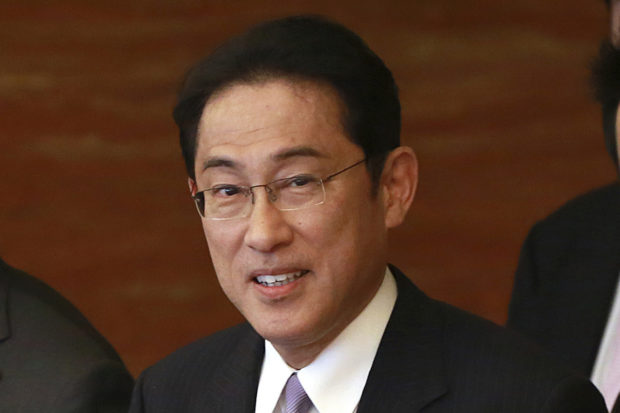
In this May 30, 2017, file photo, Japan’s Foreign Minister Fumio Kishida escorts China’s State Councilor Yang Jiechi at their meeting at the Iikura guest house in Tokyo. Japanese Prime Minister Shinzo Abe’s announcement of his planned resignation has triggered political maneuvering among top lawmakers and media speculation over who will take over the top job. Kishida was considered the party leaders’ preferred choice for the next prime minister, but his status has slipped recently. (AP Photo/Eugene Hoshiko, Pool, File)
FUMIO KISHIDA: Abe’s foreign minister from 2012-2017, the 63-year-old Kishida had once been considered the party’s preferred choice to become the next prime minister. His status has slipped, however, after he was seen as fumbling some of the party’s response to the coronavirus in his role as policy chief. In formally announcing his candidacy Tuesday, Kishida said he would be a leader who listens to the voices of the people — something Abe has been criticized for not doing enough. A low-key lawmaker from Hiroshima with a somewhat dovish stance on security issues, he has been less supportive of Abe’s longtime push to rewrite Japan’s war-renouncing Constitution. Kishida struck a 2015 settlement with South Korea on “comfort women,” victims of Japan’s wartime sexual abuse. Kishida in 2017 helped arrange then-President Barack Obama’s visit to Hiroshima, a first for a serving American leader.
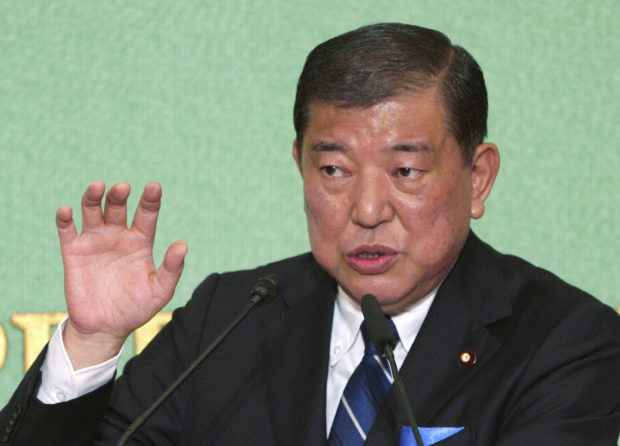
In this Sept. 14, 2018, file photo, one of the candidates for president of the ruling party Shigeru Ishiba speaks during a debate with Japanese Prime Minister and current party president Shinzo Abe ahead of the Liberal Democratic Party president election in Tokyo. Abe said Friday, Aug. 28, he is resigning due to his chronic health problem, triggering in-party maneuvering about his successor. (AP Photo/Eugene Hoshiko, File)
SHIGERU ISHIBA: A former defense minister seen as Abe’s archrival within the party, the 63-year-old Ishiba is the public’s favorite for the next prime minister in media surveys. Ishiba’s vocal criticism of Abe, however, has hurt his popularity among ruling party lawmakers. Ishiba has criticized Abe’s rule as autocratic and raised concerns about growing poverty. A soft-spoken banker-turned-politician, Ishiba is known as a defense hawk and says Japan should have stronger military capability within the current constitutional limitations. In addition to defense minister, Ishiba has also held top ministry posts in agriculture and local revitalization. He lost to Abe twice in party elections in 2012 and 2018.